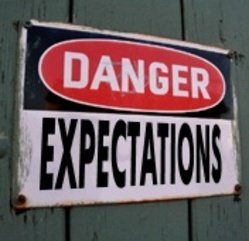
‘I have no expectations.’
Or, ‘I didn’t know what to expect.’ (The implication being that ‘I had no expectations.’)
People say this a lot. And they generally believe it when they say it; but it still cannot be true.
Why not?
Because if you feel something about a person or situation—absolutely anything at all—then you have expectations.
The error here is that most people define expectations as something deliberate and conscious. Kind of like principles, or ‘the 10 commandments.’
But expectations are implied in emotions, much of the time.
The only way to escape expectations is if you honestly and truly do not care about something. If a person or situation represents no value to you personally—not in a positive or negative way—then it’s plausible that you have no expectations. But only then.
It’s similar when someone says, ‘I didn’t know what to expect.’ That might be true. But this sentence is usually spoken in the context of anger, frustration or disappointment. ‘I don’t like how this turned out. But I don’t know what I expected.’
Yet the fact that you feel angry, disappointed or otherwise distressed is proof that you expected something; you just weren’t conscious of it. But your emotions went right along expecting anyway. That’s what emotions do. And we all have emotions, nearly all of the time, whether we make ourselves aware of them or not.
This is one of the reasons why it’s so valuable and necessary to live a self-examined life. Even in our allegedly ‘enlightened’ era, it’s commonplace for people to mock or minimize the need for psychotherapy, counseling and the like. Granted, I’m the first to acknowledge that too many therapies and therapists are not worth your time. (Check out my book.)
But it’s not therapy or counseling, as we know them, that people are usually mocking or minimizing. It’s the need to be self-aware and self-reflective.
We’re a body-centered culture, bordering at times on the mindless. We accept—and validly so—that we ought to be aware of the consequences of what we put into our bodies (drugs, alcohol, poor diet). But few of us appreciate the importance and relevance of the content of our minds, including our subconscious (where emotions reside).
That’s why so many of us get into trouble when our expectations are left unarticulated—until it’s too late. Self-awareness is considered a needless luxury—at best—and as a result most people avoid therapists or counselors like the plague because, ‘I’m not crazy.’
Crazy? Who said anything about crazy? Life is what matters here, not the avoidance of insanity (which most will never experience, fortunately.)
Expectations matter. Consider a simple decision, such as going to a movie or a restaurant. The stakes are not likely that high. You can go into the activity thinking, ‘I have no expectations.’ And then you end up disappointed, pleasantly surprised, or you get about what you ‘ expected. Regardless, the stakes are not that high and you’ll likely get over it quickly.
But the same principle applies to much more important matters. Examples: who to date; who to marry, have sex with, when to have sex; where to take a career-binding job; what steps to take in starting a business, etc.
If you go into these decisions, as many do, with an attitude of, ‘I’m not sure what to expect,’ then you had better back up and quickly take an inventory.
What are you expecting from the outcome of these decisions? Given the known facts, what’s reasonable or unreasonable to expect from the people or circumstances involved in these decisions or experiences?
It’s wise to identify—and even write down (or discuss aloud), with important matters—your expectations before becoming involved in any significant life situation, relationship, money/career matter or experience. In fact, practice on the smaller, insignificant situations first. Ask yourself, ‘What do I expect out of this encounter? Based on the known facts, what are the reasonable probabilities of these expectations coming true, or not?’
You’d be surprised how much less of an emotional roller coaster life will become when you practice this kind of self-awareness. Unless you like roller coasters. But I suggest saving those for the amusement park.
Be sure to “friend” Dr. Hurd on Facebook. Search under “Michael Hurd” (Rehoboth Beach DE). Get up-to-the-minute postings, recommended articles and links, and engage in back-and-forth discussion with Dr. Hurd on topics of interest.
